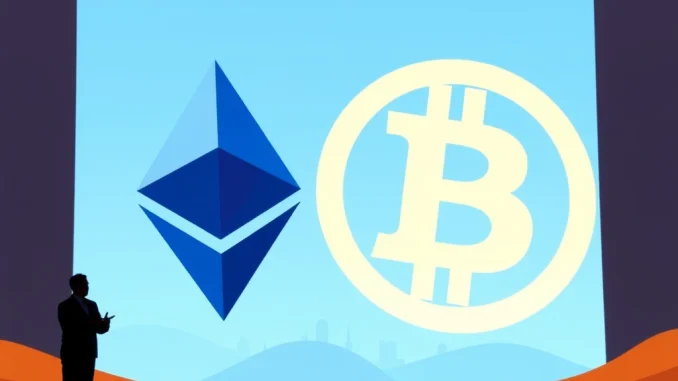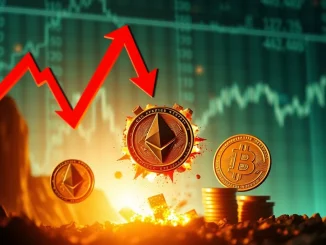
The world of cryptocurrency is often framed as a race, particularly between its two giants: Ethereum and Bitcoin. But what if one of the key architects of Ethereum sees things differently? At Consensus 2025, Ethereum co-founder Anthony Di Iorio offered a perspective that challenges the common narrative of direct competition, suggesting that Ethereum was always intended as an alternative, not a rival.
Anthony Di Iorio’s Perspective: Why Not a Bitcoin Competitor?
During his appearance at the prominent crypto conference, Anthony Di Iorio articulated a view held by some early proponents of the technology. He stated clearly that Ethereum’s initial purpose was not to dethrone Bitcoin but to carve out a unique space in the digital asset landscape. Bitcoin pioneered digital scarcity and served as a store of value, often dubbed ‘digital gold’. Ethereum, however, was built with a different core function: programmability.
This fundamental difference, according to Di Iorio, positions Ethereum as an Ethereum Alternative rather than a head-to-head competitor. While Bitcoin focuses primarily on being a decentralized currency and store of value, Ethereum provides a platform for building decentralized applications (dApps), smart contracts, and entire ecosystems.
Unlocking Ethereum’s Potential Beyond Simple Crypto Competition
The true strength Di Iorio highlighted lies in Ethereum’s broader utility. Its ability to host everything from decentralized finance (DeFi) protocols to non-fungible tokens (NFTs), supply chain management, and decentralized autonomous organizations (DAOs) gives it a scope far beyond Bitcoin’s core function. This expansive potential is why Di Iorio believes Ethereum has the capacity to eventually surpass Bitcoin in market capitalization.
It’s not necessarily about one coin being ‘better’ than the other in a direct fight, but about their distinct purposes and the total value generated by their respective ecosystems. The narrative isn’t solely about Crypto Competition; it’s also about parallel innovation and different value propositions.
Consider the key differences:
- Bitcoin: Primarily Store of Value, Digital Gold, Peer-to-Peer Electronic Cash System. Focus on security and decentralization for this specific use case.
- Ethereum: Decentralized Platform for Applications, Smart Contracts, Programmable Money. Focus on flexibility, development, and hosting a wide range of digital activities.
This distinction underscores Di Iorio’s point: they serve different, albeit sometimes overlapping, needs in the digital economy.
The Future: Can Ethereum Alternative Surpass Bitcoin?
Di Iorio’s prediction about Ethereum potentially surpassing Bitcoin in market cap is based on the economic activity its platform can generate. As more industries and developers build on Ethereum, the demand for its native asset, Ether (ETH), used for transaction fees (‘gas’) and staking, could theoretically increase significantly. This growth is driven by utility and innovation happening *on* the network, not just by its value as a standalone asset.
While the future remains uncertain and the crypto landscape is ever-evolving, Anthony Di Iorio’s perspective offers a valuable reminder that the relationship between these two foundational cryptocurrencies is complex. It’s less about a simple rivalry and more about distinct technologies evolving along different paths, with Ethereum positioning itself as the leading platform for decentralized computation and innovation, an essential Ethereum Alternative in the digital world.
Summary: Ethereum’s Unique Path
Anthony Di Iorio’s statements at Consensus 2025 reiterate a foundational idea: Ethereum was designed as a complementary technology to Bitcoin, focusing on decentralized applications and programmable assets. His belief in Ethereum’s potential to exceed Bitcoin’s market cap stems from its broad use cases and the vibrant ecosystem it supports. This perspective encourages viewing Ethereum not just as a competitor, but as a distinct and powerful alternative shaping the future of decentralized technology.



